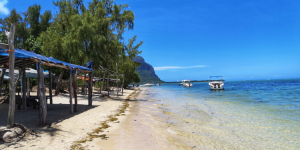
This week, advancements in pharmacovigilance through the VigiMobile tool take center stage in Mauritius. Other key developments include a strategic partnership between the UN and the government to promote cultural heritage, new educational exchange opportunities with Japan, and reinforced measures against water wastage.
VigiMobile: A breakthrough in drug safety
Mauritius is making strides in drug safety with the launch of VigiMobile. Introduced on February 18 at a workshop in Quatre-Bornes, this application, developed in collaboration with the World Health Organization (WHO), allows patients and healthcare professionals to report adverse reactions to medications and vaccines.
A major breakthrough: the Mauritian pharmacovigilance system is now connected to the WHO's global database, facilitating the exchange of crucial information for patient safety. According to Dr. Anne-Marie Ancia, WHO representative, this global network will help prevent avoidable incidents. A critical issue, considering that one in ten patients experiences care-related complications, leading to over three million deaths worldwide each year.
Cultural heritage: A strategic partnership between Mauritius and the UN
Mauritius is enhancing its tourism appeal by preserving its rich cultural heritage. On February 17, Minister of Arts and Culture Mahendra Gondeea met with Lisa Simrique Singh, the UN's resident coordinator for Mauritius and Seychelles, to establish a partnership aimed at safeguarding and promoting the country's historical sites.
The government plans to introduce entrance fees for certain heritage sites as part of its 2025-2029 agenda while developing promotional materials to attract a broader audience. The UN emphasizes the need for local community involvement and suggests leveraging Mauritius' underwater heritage, merging tourism with ecological preservation.
Strengthening educational exchanges between Mauritius and Japan
Academic relations between Mauritius and Japan are gaining momentum. On February 17, in Phoenix, Minister of Education Mahend Gungapersad met with Japanese Ambassador Mashiro Kan to discuss short-term scholarships that would enable Mauritian students and teachers to study in Japan.
These training programs, focusing on specialized disciplines such as the Kaizen methodology and Japanese disciplinary practices, could also benefit Mauritian civil servants. The ambassador also proposed exchange programs and bilateral training sessions, reaffirming Japan's commitment to education, culture, and sports. Among the proposed initiatives is the translation of Japanese literary works for Mauritian audiences.
A tougher stance on water waste
With reservoir levels reaching critical lows, Mauritian authorities are tightening regulations. As of February 17, new penalties have been introduced to combat water waste following an amendment to the Central Water Authority's regulations on February 14.
The use of hoses, high-pressure cleaners, and automatic sprinklers is now strictly regulated. Activities such as car washing, garden watering, and pool filling are particularly targeted. Offenders face severe penalties: fines of up to MUR 50,000 and two years in prison for individuals, and fines of up to MUR 200,000 for other violations. Additionally, the Water Resources Monitoring Committee will adjust agricultural irrigation frequencies based on available resources.
A significant increase in retirees
The number of retirees in Mauritius and Rodrigues has seen a notable increase. Over the past year, the pensioner population has grown from 264,601 to 274,787, marking a 3.7% rise. Of these, 268,660 reside in Mauritius and 6,127 in Rodrigues.
Statistics also reveal that 5,209 retirees are nonagenarians, while 176 have reached the centenarian milestone. Pension amounts vary by age: general retirees receive an average of MUR 15,000, while nonagenarians receive MUR 22,710 and centenarians MUR 27,710. This increase underscores the growing importance of pension management and social policies tailored to an aging population.




















Comments